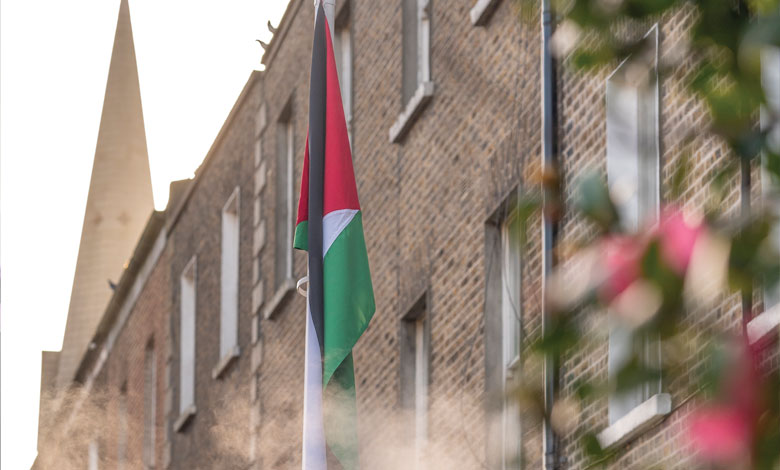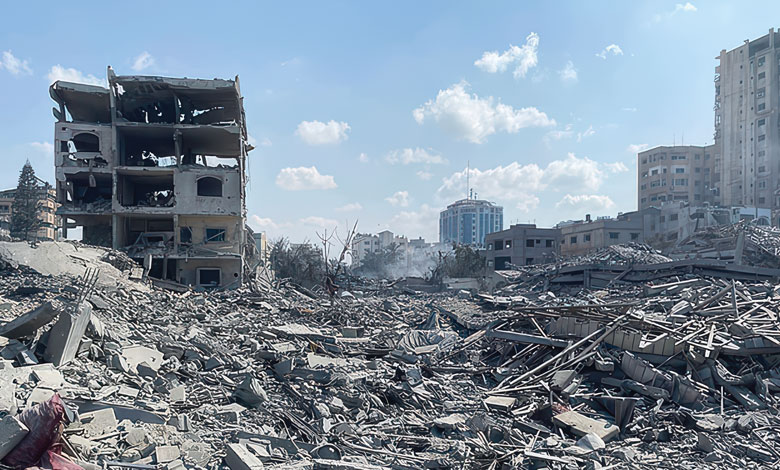Government commits to passing heavily amended Occupied Territories Bill

In the shadow of the Gaza genocide, the Government published the General Scheme of the Occupied Territories Bill in July 2025. eolas Magazine analyses the proposals which have been heavily criticised by both opponents of the genocide and supporters of the State of Israel.
The Occupied Territories Bill, officially called the Control of Economic Activity (Occupied Territories) Bill 2018, proposes the prohibition the importation of goods originating in illegal Israeli settlements located in the Occupied Palestinian Territories, including East Jerusalem and the West Bank.
Goods from these settlements are defined as any materials or products of any kind. The prohibition is enforceable under the Customs Act 2015, which allows the Minister for Foreign Affairs to designate affected areas by postal codes, following consultation with the Minister for Finance.
The explanatory notes in the general scheme of the Bill cite the International Court of Justice’s (ICJ) advisory opinion as the Bill’s foundation, framing it as a necessary step to prevent trade relations that might assist in maintaining an illegal situation. However, the legislation deliberately limits itself to the import of goods and, crucially, excludes services and investment relations.
This delineation is significant, as the Bill’s critics and supporters agree that the exclusion of services reflects legal caution regarding EU competence over trade policy. The Department of Foreign Affairs acknowledged on 1 July 2025 that the measure only brings Ireland “towards compliance” with its obligations under the ICJ advisory opinion and not fully into compliance.
The current government draft is a heavily amended version of the Bill first introduced by Senator Frances Black in 2018. The original Control of Economic Activity (Occupied Territories) Bill 2018 proposed a broader prohibition. It additionally sought to criminalise the provision of settlement services and the extraction of natural resources from occupied territories generally. It explicitly targeted investments that could entrench the occupation.
Under Black’s draft, individuals or companies engaging in trade or services linked to settlements would have faced penalties of up to five years’ imprisonment and fines up to €250,000.
The intention was that Ireland would not allow its market or financial system to support illegal settlements in the Occupied Palestinian Territories.
While the 2018 bill passed the Seanad and cleared early stages in the Dáil, it stalled after government ministers, including Taoiseach Micheál Martin TD, argued that it would be “unconstitutional” as trade policy falls within the remit of the EU.
Blinne Ní Ghrálaigh – a barrister who represented South Africa in its genocide case against Israel at the ICJ – addressed the Joint Oireachtas Committee on Foreign Affairs and Trade on 9 July 2025, asserting that “there is no basis in international law for differentiating between trade in goods and trade in services in the manner proposed”. She added that the Bill risks being “little more than window dressing”.
Ní Ghrálaigh further argued that the scaling back of the Bill weakens Ireland’s compliance with international law, claiming that excluding services and investments “fails to ensure compliance even with the duty set out in the advisory opinion requiring Ireland to distinguish between Israel and the OPT in its dealings”.
Former Fine Gael Justice Minister Alan Shatter, speaking before the Committee on 16 July 2025, asserted: “The Bill is the first initiative of any European government to enact legislation to intentionally boycott and discriminate against Jews since the defeat of Nazi Germany in 1945.”
While no other individual EU member state has introduced analogous legislation, nine member states (including Ireland) have called on the European Commission to consider trade restrictions on both goods and services linked to illegal Israeli settlements. This includes urging a review of the EU-Israel Association Agreement to ensure compliance with international law as outlined in the ICJ advisory opinion.
Shatter went on to dismiss the Bill as “fantasy politics and political theatre that does profound damage to the reputation of our state”.
State of affairs in Gaza
As of 15 August 2025, 61,827 have been killed in Gaza by Israeli forces, according to the Gaza Health Ministry. Israel claims that its campaign is an effort to destroy Hamas, the Islamist group which governs Gaza and whose military wing was responsible for the 7 October attacks, in which 1,200 civilians are estimated to have been killed.
The medical journal The Lancet has argued that the death toll, including indirect deaths because of the war, may be considerably higher than the estimates of Gazan health officials. “It is not implausible that up to 186,000 or even more deaths could be attributable to the current conflict in Gaza,” the medical journal reported as early as July 2024. In a follow-up report in January 2025, The Lancet claimed that the real death toll could be as much as 40 per cent higher than that estimated by authorities in Gaza.
A June 2025 report from the Ben-Gurion University of the Negev asserts that 377,000 people in Gaza are “unaccounted for” and estimates that the population of Gaza is now around 2 million, in contrast to the total of 2.3 million prior to the war. The report notes that it is challenging to count the number of people buried under rubble in Gaza, meaning that there is a high degree of variability in the number of deaths.
In May 2025, the United Nations – backed Integrated Food Security Phase Classification (IPC) released a report warning that the entire population of Gaza is at risk of famine.
The May-June 2025 IPC snapshot says that over 500,000 of Gaza’s estimated two million people are enduring “famine-like conditions”, while the entire region is in acute food insecurity. The report also warns that 39 per cent of Gazans are going multiple days without food, and that child malnutrition in Gaza City is 16.5 per cent, surpassing famine thresholds for the critical indicator.
“The facts are in and they are undeniable. Palestinians in Gaza are enduring a humanitarian catastrophe of epic proportions,” according to UN Secretary General António Guterres.
Where the west stands
The alleged use of starvation as a weapon of war has arguably been the main driving force in changing attitudes towards the genocide in Gaza, with the French President Emanuel Macron having announced it will recognise the State of Palestine in September 2025.
Canada and Australia also plan to recognise the State of Palestine in September 2025, following France’s lead.
In an act of perverse diplomacy, British Prime Minister Keir Starmer MP has said that the UK would also recognise the State of Palestine by September 2025 unless Israel agrees to a ceasefire, permits the UN to resume the supply of aid and commit to a peace process that “delivers a two-state solution”.
German Chancellor Friedrich Merz has warned of a “catastrophic humanitarian situation” in Gaza but has ruled out recognising the State of Palestine in the near future: “We do not currently consider the recognition of a Palestinian state to be the right step.”
The United States has also moved away from its official policy of supporting a two-state solution, with the State Department releasing a statement on 28 July 2025 claiming that a French/Saudi-led conference on a two-state solution would serve to “embolden Hamas”.
Ireland’s leadership
Ireland, as one of three EU member states to jointly recognise the State of Palestine following the commencement of the Gaza genocide, has been broadly perceived by the international community as one of the most vociferous opponents of Israel’s actions in the Palestinian territory.
The Government’s stance has been broadly popular, with a July 2025 iReach survey saying that 46 per cent of the public rate the Government’s response to the genocide as “good” or “very good”. 60 per cent believe Ireland should take a stronger public stance.
While the Government has a generally high approval rating, the cautious nature of the delay and introduction of the Bill shows that political leaders are keen to avoid harming the State’s diplomatic relations with its pro-Israel allies, namely the US.
Ireland’s relatively assertive stance has been criticised by American commentators and politicians, with US Ambassador to Israel Mike Huckabee posting on X (Twitter): “Did the Irish fall into a vat of Guinness & propose something so stupid that it would be attributed to an act of diplomatic intoxication? It will harm Arabs as much as Israelis. Sober up Ireland! Call [the Israeli Ministry of Foreign Affairs] & say you’re sorry!”
In response, Taoiseach Micheál Martin TD said: “I reject the comments made by the ambassador… This kind of row is ridiculous, given the enormity of killing and the enormity of the death and destruction that’s happening in Gaza.”
Martin also reaffirmed that the Bill will be passed: “We are going ahead with the Bill… I have said previously that there have been issues in terms of [banning the import of] services, and the impact that might have on multinational companies based in Ireland, inadvertently.
“We do not want companies that are based in Ireland, employing people, punished in any shape or form. That would be counterproductive in terms of the objective being to leverage pressure on Israel, not on Ireland.”






